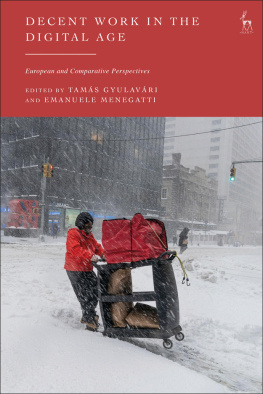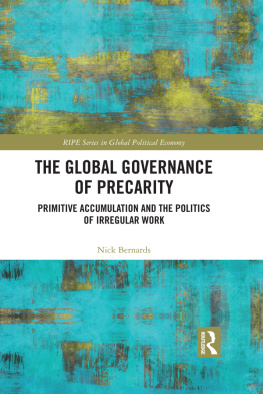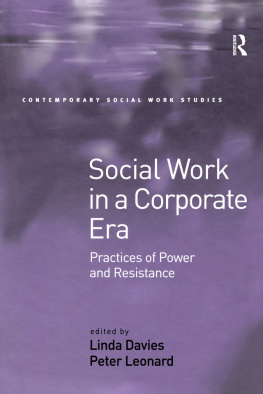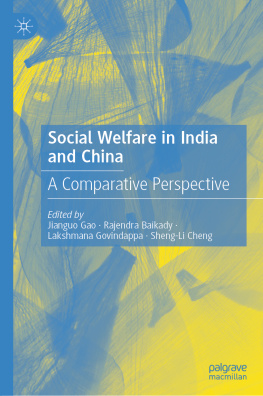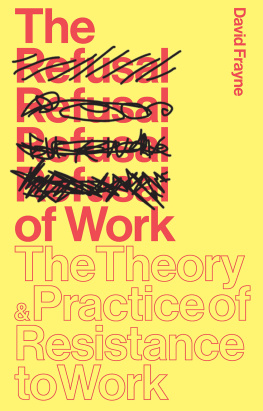THE LIMINAL WORKER
Urban Anthropology
Series Editors: Italo Pardo and Giuliana B. Prato,
University of Kent, UK
Urban Anthropology is the first series of its kind to be established by a major academic publisher. Ethnographically global, the series includes original, empirically based works of high analytical and theoretical calibre. All volumes published in the series are peer-reviewed.
The editors encourage submission of sole authored and edited manuscripts that address key issues that have comparative value in the current international academic and political debates. These issues include, but are by no means limited to: the methodological challenges posed by urban field research; the role of kinship, family and social relations; the gap between citizenship and governance; the legitimacy of policy and the law; the relationships between the legal, the semi-legal and the illegal in the economic and political fields; the role of conflicting moralities across the social, cultural and political spectra; the problems raised by internal and international migration; the informal sector of the economy and its complex relationships with the formal sector and the law; the impact of the process of globalization on the local level and the significance of local dynamics in the global context; urban development, sustainability and global restructuring; conflict and competition within and between cities.
Other titles in the series
Anthropology in the City
Methodology and Theory
Edited by Italo Pardo and Giuliana B. Prato
ISBN 978-1-4094-0833-8
Seeing Cities Change
Local Culture and Class
Jerome Krase
ISBN 978-1-4094-2878-7
The New Environmentalism?
Civil Society and Corruption in the Enlarged EU
Davide Torsello
ISBN 978-1-4094-2364-5
The Liminal Worker
An Ethnography of Work, Unemployment and Precariousness in Contemporary Greece
MANOS SPYRIDAKIS
University of the Peloponnese, Greece
First published 2013 by Ashgate Publishing
Published 2016 by Routledge
2 Park Square, Milton Park, Abingdon, Oxon OX14 4RN
711 Third Avenue, New York, NY 10017, USA
Routledge is an imprint of the Taylor & Francis Group, an informa business
Copyright Taylor & Francis, Manos Spyridakis 2013
All rights reserved. No part of this publication may be reproduced, stored in a retrieval system or transmitted in any form or by any means, electronic, mechanical, photocopying, recording or otherwise without the prior permission of the publisher.
Notice:
Product or corporate names may be trademarks or registered trademarks, and are used only for identification and explanation without intent to infringe.
Manos Spyridakis has asserted his right under the Copyright, Designs and Patents Act, 1988, to be identified as the author of this work.
British Library Cataloguing in Publication Data
A catalogue record for this book is available from the British Library
The Library of Congress has cataloged the printed edition as follows:
Spyridakis, Manos.
The liminal worker : an ethnography of work, unemployment and precariousness in contemporary Greece / by Manos Spyridakis.
pages cm.(Urban anthropology)
Includes bibliographical references and index.
1. WorkGreece. 2. UnemploymentGreece.
3. GreeceEconomic conditions21st century. I. Title.
HD5961.83.A6S69 2013
331.09495dc23
2013009596
ISBN 9781409428237 (hbk)
Contents
Acknowledgments
This book grew out of my experience in the field among workers trying to hold their lives together. Looking back over the people who played a role in shaping this text, my first and great debt is to Dr. Italo Pardo and Dr. Giuliana Prato who kindly urged me to write it. I thank my colleague Dr. Theodoros Iosifides for insisting that I not give up when, exhausted by academic duties, I was burnt out. I am grateful to my colleagues Dr. Vasilis Dalkavoukis and Dr. Ioannis Kyriakakis for reading versions of the manuscript and for their valuable comments and suggestions. I also thank Elias Chountalas and Paul John Aitken for their inestimable assistance in reading the text and making the necessary linguistic corrections. I am indebted to Neil Jordan, Senior Commissioning Editor, for his cooperative spirit and his always-present assistance. Finally I would like to warmly thank Maria Gialouri, to whom this book is dedicated, for her constant support and encouragement. Of course, it is necessary to add the usual rider that the responsibility for the contents of this book rests entirely with the author.
Manos Spyridakis
Sitia-Crete
Chapter 1
Introduction
Ubi solitudinem faciunt, pacem appellant
(Tacitus)
The Liminal Worker is about the experience of work, employment, employment insecurity and precariousness, from an anthropological point of view and in a context of high unemployment and crisis in the welfare state of contemporary Greek society. Particular emphasis is placed on how workers conceive of their condition in the workplace, their job deprivation and employment precariousness and how they attempt to deal with the effects these processes have upon their daily lives. In this view, The Liminal Worker points to the fact of a constant condition of liminality as a lived experience of workers in a post-Keynesian and deindustrialised framework, within which they are forcefully detached in symbolic and pragmatic terms from their former roles of supposed affluence, as well as from their former secure working trajectories and instead undertake a steady course of de-standardisation, coupled with feelings of ambiguity and bewilderment about their future. For this reason The Liminal Worker attempts to bring to the fore the way workers conceive of this situation through their ethnographic voices and testimonies against the antisocial background of current economic recession and crisis, as well as to contribute to the anthropologically-informed analysis and discussion of work and employment in the European context.
Within a neo-liberally oriented environment favouring adverse social incorporation, deregulated labour relations and massive layoffs, contemporary workers experience the gradual disappearance of standard employment and the advent of its casual and insecure forms as well as the emergence of vulnerable social relationships (Castel 2000), threatening not just their material survival but also their identity and whole life. Caught in a situation defined by distant economic power structures and pedagogic political technologies that advocate less social protection for the markets invisible hand, workers, being de-unionised and unable to forge a class in itself solidarity, become powerless to defend themselves and are unwittingly lead to a grey area regarding their work identity and trajectory.
As neoliberalism has become the dominant policy paradigm, its main philosophy being guided by a theological faith in the assumption that unfettered markets distribute goods and services more efficiently, workers are not just found in the middle of the complex relation between the local and the global but experience as well the devastating effects related with structural adjustment programs entailing Even though people work hard, in fact they are not praised for this whereas the various forms of employment, even full-time, do not solve the pauperisation problem to the extent that wages remain considerably low (Durrenberger and Mart 2006: 12-16). Without doubt profit accumulation through human labour exploitation is not a new phenomenon in the history of capitalism, however, its recent expression connotes clear cut dissociations from the post-Second World War social contract. As Karen Ho argues in her ethnography on Wall Street the primary mission of todays corporations is the increase of their stock prices for the benefit of their true owners, at the expense of employees who are perceived as the outsiders of their main purpose and who experience increasing job insecurity, repeated layoffs and corporate downsizing (Ho 2009: 2-3). In this context they try, in culturally and socially meaningful ways, to manage the conditions of their limbo status by entering highly exploitative labour relations, simultaneously attempting to protect themselves from becoming part of a large reserve workforce, which is rapidly growing. Ethnographic evidence shows that they make decisions based on their own experience and on what they can find out about possible employment, attempting at the same time to cope with various circumstances of risk and uncertainty coming from government policies and the markets (Durrenberger and Mart 2006: 5). Likewise, the ethnography of this book, referring to the Greek context, explores workers responses to and representations about fast-paced economic and organizational changes challenging empirically the assumption of market forces naturalness.




